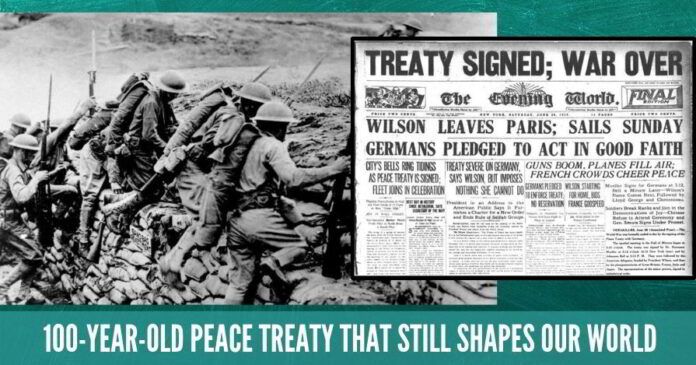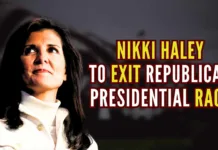
As we approach the centenary of the signing of The Treaty of Versailles, we must try not to make the same catastrophic mistakes again.
At the end of World War I, leaders of the victorious allies—the United States, Britain, France and Italy—arrived in Paris to begin the Herculean task of ending the First World War and trying, as best they could, to prevent another.
As we approach the centenary on June 28 of the signing of The Treaty of Versailles in the glittering Hall of Mirrors of the palace of a succession of French kings, we must try not to make the same catastrophic mistakes again. Now, at least, we have a roadmap. But one that too many of our leaders today seem determined to ignore at every turn.
“They have pulled up armchairs and crouch low over the map,” Nicolson reports. “They are cutting the Baghdad railway. It is appalling that these ignorant and irresponsible men should be cutting Asia minor to bits as if they were dividing a cake….the happiness of millions being discarded in that way.”
From my earliest days at Harvard a half century ago to the publication of my last book, “A Shattered Peace: Versailles 1919 and the Price We Pay Today,” I’ve made a bit of a career studying this treaty, what led up to it, the context of the negotiations and especially its horrific consequences. And if there is one lesson I’ve learned, it’s a simple one: Do not, under any circumstances, use an international agreement as a vehicle for either vengeance or hubris.
Certainly, participants in negotiations beginning at the G-20 level on Friday —particularly the various discussions ranging from nuclear issues surrounding North Korea and Iran to Ukraine, Yemen and a host of other regional conflicts—could learn from the failures and fissures first laid bare at Versailles.
There was evidence from the very beginning of how badly off-course this negotiation would be. Even before their arrival in Paris for the negotiations, the leaders of Britain and France had pledged to exact vengeance and tribute from their defeated adversaries.
President Woodrow Wilson arrived seeking not a pound of flesh, but a far better world. He was outnumbered and, as a novice in the jungle of European power politics, outmanoeuvred at every turn as he sought to make good on the grand moral principles on which he based America’s entry into a war far from his nation’s shores.
Consider today. Are negotiations or treaties arrived at from the perspective of seeking to exact vengeance more appropriate than those righting wrongs? The mentality of retribution against Germany, for instance, that the allies brought to France and sought to enshrine in the Versailles Treaty, sadly, drives too many actions today. It does little good for the United States to threaten fire and brimstone on North Korea, or to utterly demolish the economy of Iran if President Donald Trump does not truly understand the long-range consequences.
It would be worth examining a number of these catastrophic errors of fact or judgment whose consequences are now so clearly evident.
First, don’t seek to destroy your enemy. Germany had already been badly beaten in the war—it was near bankruptcy, its military might shattered. But British Prime Minister David Lloyd George had promised his country’s voters that he would recoup British losses, which his government estimated at £24 billion ($100 billion at the time or $1.2 trillion today) —far beyond the ability of any nation at the time, especially one utterly prostrated by this conflict, to have managed. And Lloyd-George came very close to winning his demands—so close in fact that one of his top economic advisors, John Maynard Keynes, quit the delegation in disgust, returned to England and quickly produced his masterpiece, “The Economic Consequences of the Peace.”
Then there is the second lesson—understand your enemy. One extraordinary scene plays out as a young British diplomat, Harold Nicolson, is summoned into the living room of the elegant townhouse in Paris’s chic 16th arrondissement that Wilson is renting. It was a month before the treaty they’d been negotiating since January was to be signed and Nicolson found the leaders of the US, France and Britain crawling around on an enormous map of the Middle East spread out on the floor, creating the new nation of Iraq.
“They have pulled up armchairs and crouch low over the map,” Nicolson reports. “They are cutting the Baghdad railway. It is appalling that these ignorant and irresponsible men should be cutting Asia minor to bits as if they were dividing a cake….the happiness of millions being discarded in that way.”
Indeed, in such a fashion, the map of the world was re-drawn more sweepingly than at any other time in history. New nations were created—Czechoslovakia and Yugoslavia—that would only a half-century later be transformed back into their component nations of the Czech Republic and Slovakia and, following another bloody Balkan war, into seven nations of the former Yugoslavia.
Then there were the countries of Iraq, Syria, Jordan and the Palestinian territories that would eventually become the state of Israel, all created by the breakup of the Ottoman Empire with little understanding of the people, their religions, cultures and ancient animosities that comprised them. Today, our armies must defend these borders and these nations.
President Wilson’s chief Middle East advisor was a Columbia University historian. William Westermann’s expertise ranged from ancient Egyptian papyri to the Crusades, meaning his real experience with the region ended with the Ninth Crusade in 1291.
Another of Wilson’s Mideast advisors likened the Kurds, who were divided between Iran, Turkey, Syria and Iraq rather than given their own nation, to American Indians. Yet, creating a single Kurdish nation could have provided an anchor to a peaceful Mesopotamia, had their aspirations been remotely understood.
Of course, this process was already well under way before the war had even ended. In 1916, two British and French diplomats, Mark Sykes and François Georges-Picot, with the approval of the Italians and Russians, had already divided up the Ottoman Empire and much of the Middle East into spheres of influence in the secret Sykes-Picot Agreement. President Wilson sought unsuccessfully to have all such secret pacts neutered under the Versailles Treaty: only one of his many failures.
Wilson refused even to hear from Nguyen Tat Thanh, a busboy at the Ritz Hotel where delegates dined many evenings. He’d come to Paris hoping to win freedom for his native Vietnam, then a French colony. When his crusade ended in bitter failure, he embraced communism, went off to Moscow and eventually found his way back to Vietnam under the assumed name of Ho Chi Minh.
There were a host of other opportunities offered and missed—approaches from Lenin and the new Bolshevik government in Moscow; efforts to achieve an even-handed division of power in Asia between China and Japan that led to the rise of the Chinese Communist Party and a militant Japan, prepared to confront America and the West in World War II; creation of a nascent Jewish homeland with little reference to the Palestinians who lived on these same lands.
But above all, there was Wilson’s failure to achieve a treaty that could win approval from a hostile Senate when he returned to Washington from what was the longest negotiation, indeed longest overseas trip ever undertaken, by an American president. Never understanding the value of including opposition Senate Republicans on the peace delegation, he failed to win not only ratification but American membership in the League of Nations he had fought so desperately to create.
Today, it would be well for Donald Trump and whoever might succeed him to understand the value of judicious, informed and inclusive diplomacy. From Lloyd-George’s desire for his pound of flesh to France’s urge to utterly defeat an already crushed enemy, the horrific consequences of Versailles greatly outweighed any immediate personal gratification or domestic political success.
- NIA confiscates Pak-harboured Khalistani terrorist Lakhbir Singh Rode’s key aide’s land in Moga - April 19, 2024
- Prime Minister Narendra Modi: A Gujju businessman who does not invest his precious time for a losing battle - April 13, 2024
- NIA arrests two accused Shazib and Taahaa in Bengaluru’s Rameshwaram Cafe blast case from Kolkata - April 12, 2024










